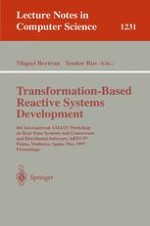1997 | ReviewPaper | Chapter
Refining interval temporal logic specifications
Authors : Antonio Cau, Hussein Zedan
Published in: Transformation-Based Reactive Systems Development
Publisher: Springer Berlin Heidelberg
Included in: Professional Book Archive
Activate our intelligent search to find suitable subject content or patents.
Select sections of text to find matching patents with Artificial Intelligence. powered by
Select sections of text to find additional relevant content using AI-assisted search. powered by
Interval Temporal Logic (ITL) was designed as a tool for the specification and verification of systems. The development of an executable subset of ITL, namely Tempura, was an important step in the use of temporal logic as it enables the developer to check, debug and simulate the design. However, a design methodology is missing that transforms an abstract ITL specification to an executable (concrete) Tempura program. The paper describes a development technique for ITL based on refinement calculus. The technique allows the development to proceed from high level “abstract” system specification to low level “concrete” implementation via a series of correctness preserving refinement steps. It also permits a mixture of abstract specification and concrete implementation at any development step.To allow the development of such a technique, ITL is extended to include modularity, resources and explicit communication. This allows synchronous, asynchronous and shared variable concurrency to be explicitly expressed. These constructs also help in solving the problems, like lack of expressing modularity, timing and communication, discovered during the use of ITL and Tempura for a large-scale application [2].
